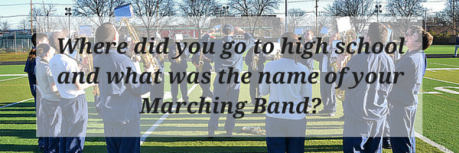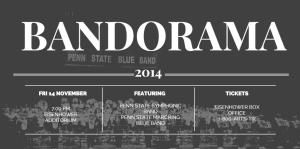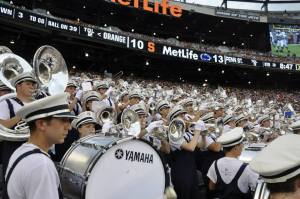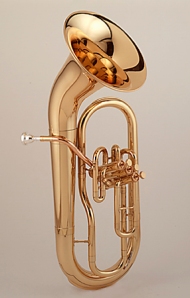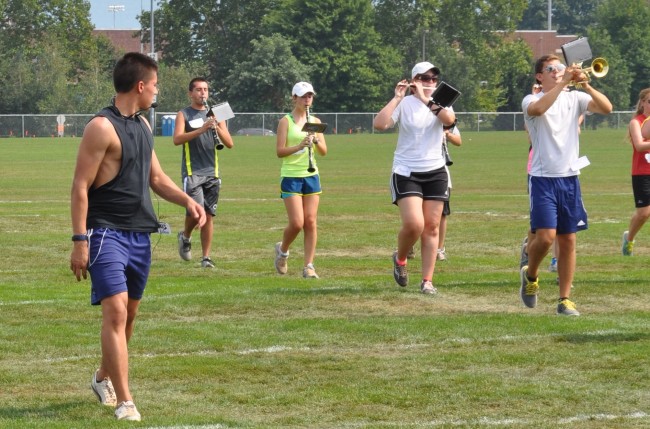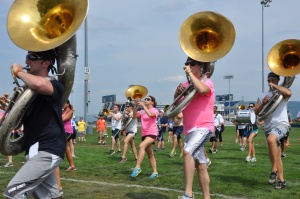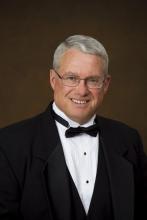April 8, 2013
The Alumni Blue Band Association (ABBA) was started in 1962 to give Blue Band members the chance to stay involved after their
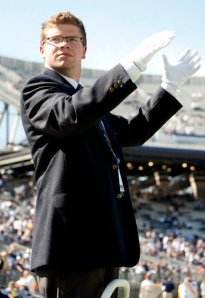
Caleb conducting at a football game as a Grad Assistant in 2010.
graduation. ABBA’s Staff Assistant is Caleb Rebarchak. Caleb marched in the Blue Band and was also a Graduate Assistant for the band in 2010 and 2011.
This conversation happened at the end of the interview when I realized I hadn’t asked him anything about his experience with the Blue Band.
Me: What did you play?
Caleb: I played saxophone.
Me: Tell me about your Blue Band experience.
Caleb: I marched for a year, in 2005. I was E2. When I was a grad student Alex Hesse was marching E2 both years. My friend Chris Ritter also marched E2 in the old pregame. I was the first year of the new pregame. It was fun! I still, even as a grad assistant, am excited to see the looks on the rookie member’s faces when they come out for pregame because I still got that rush. It wasn’t quite the same, but I still got that feeling being on the field as a graduate assistant, doing the slap-taps as the band is coming out on the field. It was exciting. Two stories I remember from undergrad, both from our bowl trip to the Orange Bowl. It was the first bowl in a number of years, 2005 was the comeback season. We were rehearsing in the evening, hadn’t done pregame for 5 weeks at that point. I had earned my pregame spot by the third week of the season by memorization and I kept forgetting a mark time 4 and I’d make a right turn and just go. That was the only time I’ve been called out from the ladder. He was at the top of the bleachers, “The saxophone player at the tip of the S, do you know what you’re doing?” “Yes, sir!”
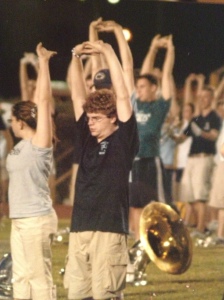
Caleb as an undergrad in 2005
The other story that I would tell, I told the staff this when I was a grad assistant and Mr. Cree actually remembered it. A guide and I were eating dinner the day of the bowl game and the buses were parked between us and the stadium. A bunch of us were eating together. People would say they were throwing out trash and they wouldn’t come back. Eventually it was just the guide and I, and she said, “Caleb, I don’t know where everyone went. I think we better wrap up and go find everyone.” We get to the other side of the buses and we couldn’t hear parade order. We could see the sousas in back band marching about a quarter-mile away. We grabbed our saxophones and just ran. We were in front band. We just ran and ran and people were saying, “The band’s that way! Just keep going!” And we ran by the staff and got in our spots right before we went into the stadium.
Me: For the actual game?
Caleb: Ya, the band was about to go into the stadium entrance to get into the stadium when we got to our spots. Everyone was like, “Where were you guys?!” and we were like, “Why didn’t you get us?!” That was the game that was triple-overtime.
Me: Did you win?
Caleb: Oh ya. On a field goal. I actually have a picture of that last field goal. If you zoom in you can see where the ball is right before it
goes through the uprights. And Michael Robinson conducted the band afterwards. I had no voice after that. We got back to the hotel at 3 [am]. Marching was great, but the times that I really really love were my two years as a grad assistant here.
Me: Like when everyone was chanting your name, whatever game that was, we came back to the Blue Band Building after a game and everyone was chanting your name.
Caleb: That was when we marched the show I wrote.
Me: Oh ya! How did that feel?
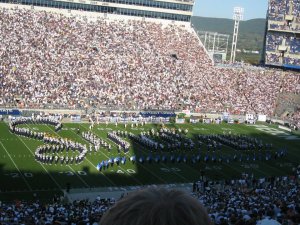
The script Sinatra formation from the show that Caleb wrote.
Caleb: It was humbling. Ya. Dr. Bundy had put a lot of trust in a Graduate Assistant, who had never written a show all by himself, to write a show for a Big Ten band at a big football game. That in itself was very humbling. The fact that the band put up with me teaching that show, and it came together as well as it did. You guys worked hard. That was a testament to how hard you guys worked and I can’t say enough how much I appreciated that. It was a very special feeling. I just wrote it out, but you guys did it. You guys did the hard work. That script Sinatra formation was… ya… that was cool.
We talked about ABBA at the beginning of the interview.
Caleb: I have some notes here about George Pyle, who has come back for a number of years. He’s 88 and it was cool to meet him in person last year. He’s the one who has been coming the longest [to Homecoming]. I don’t know what his record is, but it’s been a while that he’s been coming back. He’s still on the field he’s still walking and playing.
Me: What does he play?
Caleb: Trombone. It was really sweet and inspirational to see that.
Me: What is your role with ABBA?
Caleb: My role is Staff Assistant, that’s my official title. My role is a lot of secretarial duties. Homecoming is the biggest event of the year, obviously. That’s just a lot of people coming in… I came in to this position after stuff had been sent out for Homecoming and it was a trial-by-fire of figuring out what needs to go where so I greatly appreciated the grace that the alumns extended to me regarding how things were done and mistakes that were made and things that I did not do quickly enough. People helped out and stepped up. The Homecoming chair was really helpful too, making sure I was OK with what had to be done around here. Part of what I do for Homecoming is setting the block band and having done grad assistant duties for two years with the Blue Band, it wasn’t that different. It was kind of fun. The other big events that we have are a basketball game in December and Blue White is another big thing. Throughout the year there are Alumni Band performances, just like the Blue Band has off-season performances. There’s a chair person who’s in charge of that. I just make things run as smoothly as they can. Right now what we are doing is slowly making a transition to do more electronic stuff as far as registration for things. It’s talking with the technology person, Mark Poblete, and the President, Art Miley, how easy is this going to be, what needs to be collected, what is it going to look like if we do some of these events as online registrations. An alumn will email me saying they changed their address and I will make sure that gets noted. One of the things that I’m starting to do is, from the database of the ABBA members, I made a list of everyone who’s an Alumni Majorette and I’m going to be doing that with other instrument groups so it’s easier to communicate.
Caleb went on to describe how they are also trying to organize all of the memorabilia and historical items as well as create a new clothing order.
Another transition that the Alumni Blue Band Association is trying to make is to include members who had participated in Pride of the Lions Basketball Pep Band and the Fall Athletic Band that plays for volleyball games. Caleb said that in the past, the majority of the members in those pep bands were also in Blue Band so there was no need to make a distinction. Dr. Bundy and Professor Drane have helped to grow those groups and Caleb said that because of them, they are now the biggest they have ever been. The majority of the members are people outside of the Blue Band. ABBA is looking forward to getting those members involved and is forming a committee to make it happen. The addition of these members could mean more performances for ABBA.
Me: What are the benefits of being a member of ABBA?
Caleb: Well there are different levels of membership. There’s a Performing Membership which means you can perform at Homecoming. That’s the standard membership. Along with that there’s a Dual Performing Membership for families. There have been a lot of Blue Band couples over the years that join at that level. One of the things that has been more successful over the past years is the Returning Block Membership. Someone who was a member but then wasn’t for a number of years can join again at a reduced rate. We’ve had a great response from that this past season. We’ve had over 100 members who wanted to rejoin at that level. Those memberships all make you eligible to perform at Homecoming, which is the only event that we “restrict”. In order to march in the block you have to be a performing member. There’s also a Sustaining Membership where you get the newsletter but don’t always hear about events. You don’t get the chance to march in Homecoming but you still get updated.
Me: What are the requirements of being a member?
Caleb: You have to pay dues annually and we really want to get everyone involved. This is why Art Miley is forming all of these committees. We have people who want to help. We need a lot of help with Homecoming each year. We’ve been especially trying to involve younger members, graduates from the past 5 or 10 years. There is a year of free membership after you graduate, but we want to keep them involved and coming back.
Me: How do you become a candidate to be elected for the board?
Caleb: You indicate that with your membership and there’s a Nominations and Elections chairperson. Whenever elections come up, emails are sent out and people can express their interest in running and give a short bio. We email that out to the membership. This year we’ve been using Election Buddy as our tool which has gone pretty well. If anyone is looking for an elections-facilitating website, use electionbuddy.com!
Caleb says there’s a chance he might volunteer for another season of assisting the Blue Band. He said that he had never known a group of students for more than two years, so coming back for the final year of the rookie class he started with would be a special experience.
